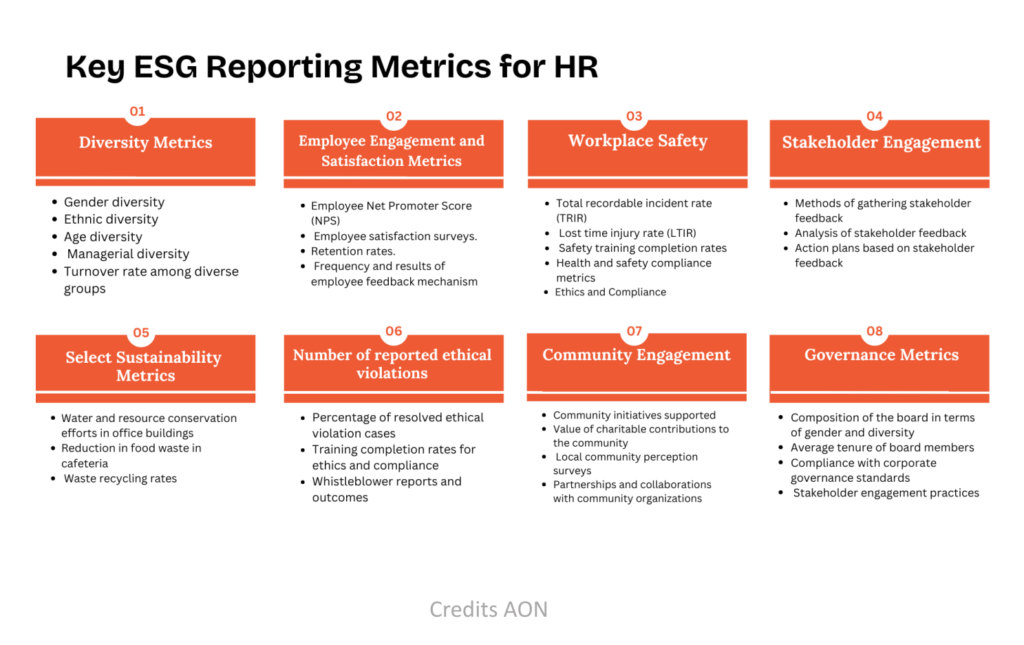The way businesses operate today is changing. It’s no longer just about profits- companies are now judged on their environmental, social, and governance (ESG) impact.
For HR professionals, this shift means one thing: ESG metrics are now critical in shaping company culture, employee satisfaction, and stakeholder trust. But which ESG metrics should HR focus on? And how do you measure them effectively?
Let’s break it down into eight key ESG reporting metrics that every HR consultant should track.

Diversity Metrics: How Inclusive is Your Workforce?
A diverse workplace leads to better decision-making, higher creativity, and improved employee satisfaction. But diversity is more than just a buzzword; it needs to be measured.
Key Diversity Metrics:
- Gender diversity
- Ethnic diversity
- Age diversity
- Managerial diversity
- Turnover rate among diverse groups
Tracking these metrics helps HR professionals identify gaps in representation and create initiatives that foster inclusivity.
Employee Engagement and Satisfaction: Are Your Employees Happy?
Happy employees are productive employees. Measuring employee engagement is essential to building a thriving workplace culture.
How to Measure Engagement & Satisfaction:
- Employee Net Promoter Score (eNPS)
- Employee satisfaction surveys
- Retention rates
- Frequency and results of employee feedback mechanisms
By gathering and acting on feedback, HR teams can improve retention, morale, and overall workplace satisfaction.
Workplace Safety: Prioritizing Employee Well-Being
A safe workplace is a fundamental right for all employees. Workplace safety metrics help HR teams ensure compliance with regulations and improve working conditions.
Key Safety Metrics:
- Total recordable incident rate (TRIR)
- Lost time injury rate (LTIR)
- Safety training completion rates
- Health and safety compliance metrics
- Ethics and compliance adherence
Regular safety audits and training sessions can drastically reduce workplace injuries and improve overall safety culture.
Stakeholder Engagement: Are You Listening to Your People?
Employees, customers, investors, and communities, all are stakeholders in a business. Effective stakeholder engagement ensures their voices are heard and valued.
How HR Can Measure Engagement:
- Methods of gathering stakeholder feedback
- Analysis of stakeholder feedback
- Action plans based on stakeholder input
This fosters a transparent workplace where employees feel heard and valued, leading to higher engagement and loyalty.
Sustainability Metrics: The HR Role in a Greener Workplace
Sustainability is no longer just an environmental concern, it’s a business priority. HR plays a key role in driving sustainability initiatives.
Essential Sustainability Metrics:
- Water and resource conservation efforts in office buildings
- Reduction in food waste in cafeterias
- Waste recycling rates
Encouraging green practices at work not only benefits the environment but also improves employee morale and corporate reputation.
Ethical Violations: Tracking Integrity in the Workplace
Workplace ethics define a company’s culture. Reporting ethical violations ensures a fair and safe working environment.
Key Metrics for Ethical Compliance:
- Percentage of resolved ethical violation cases
- Training completion rates for ethics and compliance
- Whistleblower reports and outcomes
Companies with strong ethical policies are more likely to retain top talent and maintain trust among stakeholders.
Community Engagement: Beyond Business, Creating Impact
HR isn’t just about internal operations, it also plays a role in a company’s relationship with the broader community.
Ways to Measure Community Engagement:
- Community initiatives supported
- Value of charitable contributions
- Local community perception surveys
- Partnerships with community organizations
Strong community engagement fosters a positive brand image and boosts employee pride in their workplace.
Governance Metrics: Building a Strong Leadership Structure
Good governance practices create stability and ensure long-term business success.
Critical Governance Metrics:
- Composition of the board in terms of gender and diversity
- Average tenure of board members
- Compliance with corporate governance standards
- Stakeholder engagement practices
Transparent governance policies not only build investor confidence but also create a workplace employees can trust.
HR is at the heart of ESG reporting. By tracking these key metrics, HR professionals can drive real change in workplace culture, diversity, safety, and ethics.
If you’re an HR professional, now is the time to integrate ESG metrics into your strategy. It’s not just about compliance; it’s about building a better workplace for the future.
How is your company tracking ESG metrics?
Your HR data can drive purpose, not just policies.
Let’s turn your ESG metrics into your competitive edge. Contact us


